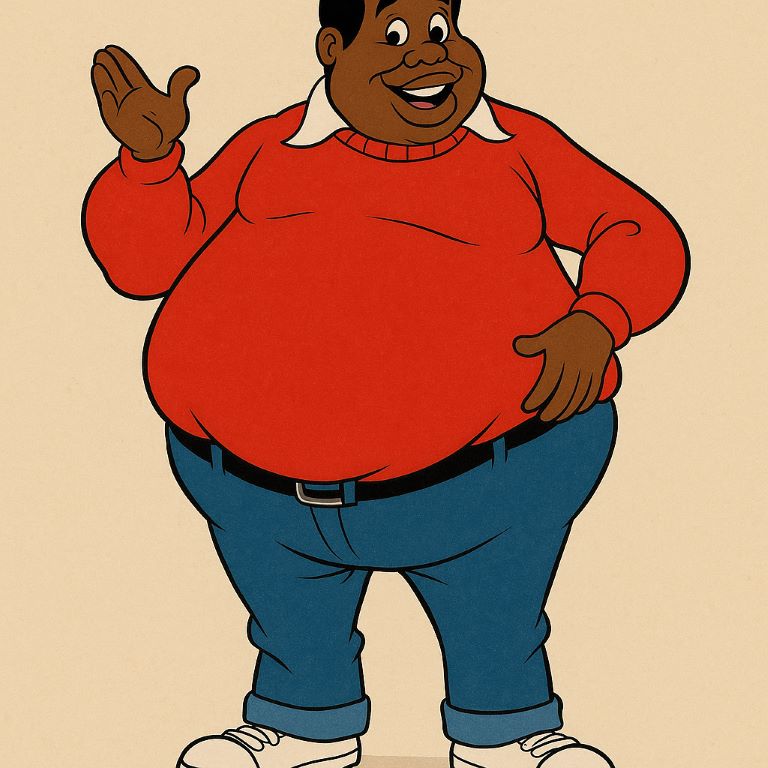Fat Albert Basic Information

Fat Albert as depicted in the original Filmation series
Fat Albert
💭Cartoon Chat with Fat AlbertCreation Info
First Appearance
September 9, 1972 (Fat Albert and the Cosby Kids TV series)
Creator
Bill Cosby (based on his real childhood friend Albert Robertson)
Series
Fat Albert and the Cosby Kids
Copyright
Filmation Associates / Entertainment Rights
Identity
Species
Human (African-American)
Gender
Male
Age
Teenager (approximately 12-14 years old)
Birthday
Not specified
Occupation
Student, Leader of the Junkyard Gang
Fat Albert's Appearance
Physical Features
Height
Tall and large for his age
Body Type
Overweight/Obese but athletic
Color Scheme
Dark skin, black hair
Signature Style
Outfit
Red shirt, blue jeans
Catchphrase
Hey hey hey!
Accessories
Sometimes carries makeshift musical instruments from junkyard
Fat Albert Character Background
Origin Story
Based on Bill Cosby's real childhood friend Albert Robertson from his Philadelphia neighborhood. The character first appeared in Cosby's 1968 Grammy-winning comedy album 'Revenge' before being adapted for television.
Character Timeline
Comedy Album Debut
First mentioned in Bill Cosby's Grammy-winning album 'Revenge'.
TV Series Launch
Fat Albert and the Cosby Kids premiered on CBS, running for 13 successful seasons.
Emmy Recognition
The series won Emmy Awards for Outstanding Animated Program.
Live-Action Film
Starred in the live-action film 'Fat Albert' with Kenan Thompson.
Series Conclusion
The original series ended after 110 episodes and 3 specials.
Fat Albert's Personality
Personality Traits
- Caring / Compassionate
- Optimistic / Positive
- Leadership qualities
- Gentle / Kind-hearted
- Wise beyond his years
- Athletic despite appearance
- Moral compass
- Enthusiastic
Strengths
- Natural leader and mediator
- Brings out the best in others
- Strong moral values
- Athletic ability despite size
- Problem-solving skills
- Loyalty to friends
Weaknesses
- Sometimes too trusting
- Can be overly optimistic
- Occasionally naive about complex situations
Goals
- To help his friends learn and grow
- To keep the gang together and positive
- To teach valuable life lessons
Fears
- Letting his friends down
- Not being able to help when needed
Fat Albert's Gallery
Fat Albert's Abilities
Special Powers
- Natural leadership abilities
- Moral guidance and wisdom
- Athletic prowess despite size
Skills
- Conflict resolution
- Teaching and mentoring
- Music (plays makeshift instruments)
- Sports (surprisingly agile)
- Problem-solving
Fat Albert's Relationships
Friends
Fat Albert Awards & Recognition
- Emmy Awards for Outstanding Animated Program
- Educational recognition for positive messaging
Fat Albert Cultural Influence
Pop Culture Impact
Fat Albert became an iconic figure in children's television, known for combining entertainment with education. His catchphrase 'Hey hey hey!' is instantly recognizable across generations. The show was groundbreaking for featuring positive African-American characters in animation.
Social Impact
The series was notable for addressing real social issues facing urban youth, including peer pressure, bullying, and family problems, while maintaining an optimistic and educational approach. It helped normalize diverse representation in children's programming.
Fat Albert's Theme Colors
More About Fat Albert
Famous Catchphrases
- 'Hey hey hey!'
- 'I'm gonna tell you a story...'
- 'Come on, gang!'
- 'We're gonna have some fun!'
The Junkyard Gang
Fat Albert leads a diverse group of friends known as the Junkyard Gang, each with their own unique personality and quirks. Together, they navigate the challenges of growing up in an urban environment while learning valuable life lessons about friendship, honesty, and doing the right thing.
Educational Purpose
Each episode of Fat Albert and the Cosby Kids featured educational content and moral lessons, often introduced by Bill Cosby in live-action segments. The show tackled real issues like peer pressure, stranger danger, and the importance of education, making it both entertaining and instructive for young viewers.
Fat Albert In Their Own Words
Character Introduction
"Hey hey hey!" It's Fat Albert, the beloved leader of the Junkyard Gang from the classic animated series Fat Albert and the Cosby Kids! Created by Bill Cosby and based on his real childhood friend, Fat Albert has been teaching kids valuable life lessons since 1972 with his positive attitude, caring nature, and infectious enthusiasm.
Personality Traits
Despite his large size, Fat Albert is surprisingly athletic and serves as the moral compass for his group of friends. He's optimistic, caring, and wise beyond his years, always ready to help his friends learn from their mistakes and grow as individuals. His gentle leadership style and ability to mediate conflicts make him the natural leader of the Junkyard Gang.
Educational Impact
Fat Albert and the Cosby Kids was groundbreaking for its time, combining entertainment with education in a way that resonated with children. Each episode featured real-world problems and positive solutions, teaching kids about friendship, honesty, responsibility, and the importance of doing the right thing. The show's educational approach earned it Emmy recognition and a lasting place in children's television history.
Cultural Legacy
More than just a cartoon character, Fat Albert represents positive values and the power of friendship. His catchphrase "Hey hey hey!" has become part of popular culture, and the show's influence can be seen in later educational children's programming. The series broke important ground by featuring positive African-American characters in animation and addressing urban youth issues with optimism and wisdom.